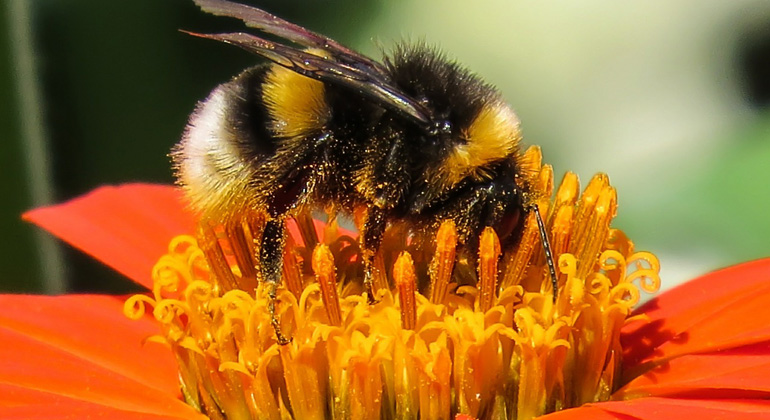Rapid decline in bumblebee species caused by climate change, study finds
In the most comprehensive analysis of climate change impacts on critical pollinators, researchers have found that rapid declines in bumblebee species across North America and Europe have a strong link to climate change.
The study was published in Science today. It was conducted by scientists from University of Ottawa and other North American institutions. Scientists from the Helmholtz Centre for Environmental Research (UFZ), as one of the major partners from Europe, were responsible for coordinating basic data collection.
“Pollinators are vital for food security and our economy, and widespread losses of pollinators due to climate change will diminish both,” stated Professor Jeremy Kerr, Department of Biology. “We need to figure out how we can improve the outlook for pollinators at continental scales, but the most important thing we can do is begin to take serious action to reduce the rate of climate change.”
Though previous studies conducted on other species at smaller scales have showen that species expand to the North Pole as climate warms, these new findings show that bumblebee species are not re-locating. Instead, they are losing range from the south, disappearing over huge areas with rapid warming at continental scales.
This is the first cross-continental analysis to study how a large group of pollinator responds to climate change. The study has also discovered a new biological mechanism that explains how species may respond to climate change based on their evolutionary past.
“We’ve lost around 300 km from the ranges of bumblebees in southern Europe and North America. The scale and pace of these losses are unprecedented. We need new strategies to help these species cope with the effects of human-caused climate change, perhaps assisting them to shift into northern areas,” urged professor Kerr.
The study used long-term observations across Europe and North America over 110 years with a database of approximately 423,000 georeferenced observations for 67 bumblebee species. The observations tested for latitudinal and thermal limits and movements along elevation gradients. Together with professor Pierre Rasmont from the University of Mons, Belgium, Dr. Oliver Schweiger (UFZ) was responsible for coordinating the collection of approximately 240,000 observations.
Tilo Arnhold
Publication
Jeremy T. Kerr, Alana Pindar, Paul Galpern, Laurence Packer, Simon G. Potts, Stuart M. Roberts, Pierre Rasmont, Oliver Schweiger, Sheila R. Colla, Leif L. Richardson, David L. Wagner, Lawrence F.Gall, Derek S. Sikes, Alberto Pantoja (2015): “Climate change impacts on bumblebees converge across continents” Science. 09 July 2015.








